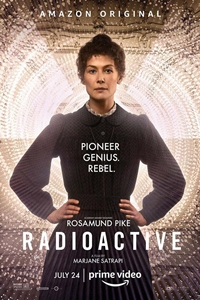Radioactive (PG-13) ★★
 Just because a person's accomplishments are great, it doesn't follow that a movie about their life and achievements will be equally as compelling. Many feats and undertakings are not inherently cinematic and, no matter what efforts a filmmaker may attempt to enliven the proceedings, movies about these individuals may seem to lack energy. Marie Curie (née Sklodowska), inarguably one of the most important scientists of the 20th century, is one such example. Perhaps with a different approach, Radioactive might have generated more of a spark, but the relatively straightforward bio-pic trajectory favored by director Marjane Satrapi (from a screenplay credited to Jack Thorne and based on the graphic novel by Lauren Redniss) is by turns overwrought and somnambulant. And, although it does an adequate job of illustrating the reasons why history remembers Curie, it feels more like a Victorian/Edwardian era soap opera than the chronicle of a scientific pioneer.
Just because a person's accomplishments are great, it doesn't follow that a movie about their life and achievements will be equally as compelling. Many feats and undertakings are not inherently cinematic and, no matter what efforts a filmmaker may attempt to enliven the proceedings, movies about these individuals may seem to lack energy. Marie Curie (née Sklodowska), inarguably one of the most important scientists of the 20th century, is one such example. Perhaps with a different approach, Radioactive might have generated more of a spark, but the relatively straightforward bio-pic trajectory favored by director Marjane Satrapi (from a screenplay credited to Jack Thorne and based on the graphic novel by Lauren Redniss) is by turns overwrought and somnambulant. And, although it does an adequate job of illustrating the reasons why history remembers Curie, it feels more like a Victorian/Edwardian era soap opera than the chronicle of a scientific pioneer.
Hands-down, the best thing about Radioactive is the performance of Rosamund Pike, who humanizes the icon, making her fiery, combative, prideful, and full of self-doubt. However, the film's attempts to craft a passionate love story featuring Marie and her husband, Pierre, are undermined by a lack of chemistry between Pike and co-star Sam Riley. Part of the problem is that Pierre is underdeveloped and, as a result, he never seems like more than a supporting character in a narrative that needs him to be a little more substantive than that.
Radioactive opens in 1934 around the time of Curie's death; the majority of the film is therefore presented as a flashback (and sometimes a flashback-within-a-flashback). It primarily chronicles Curie's time spent in Paris, beginning in 1893 when she is working for Professor Gabriel Lippmann (Simon Russell Beale). After being ejected from Lippmann's laboratory for being too demanding, she is offered a space by her future husband, Pierre. The two develop a professional and personal relationship and are married in 1895. They have children and live together happily for many years. During that period, their investigations into the strange behavior of uranium bears fruit - not only do they discover "radiation" (a term they coin) but they uncover two new elements: Polonium and radium. This results in a pair of Nobel prizes for Marie - one in physics that she shares with Pierre (in 1903) and another in chemistry that is awarded to her alone (in 1911).
Radioactive's one departure from the traditional bio-pic template is to present brief snippets looking into various future uses/implications of radiation during the years following its discovery. A scene set in the 1950s shows a doctor explaining how he might be able to use radiation to degrade a cancer tumor. Another vignette illustrates the devastating potential of splitting the atom when the Enola Gay drops Little Boy on Hiroshima. There's also a depiction of nuclear weapon testing in the desert. However, instead of having the intended effect of giving Radioactive greater depth and scope, these interludes illustrate how bland Curie's life is by comparison. I realized I would have preferred to view a full movie about any of these side-stories than the one I was watching.
For anyone in search of a primer on the Curies and the importance of their discoveries, Radioactive fulfills the objective without subjecting the viewer to a textbook-style dissertation. As an epic bio-pic about one of the most influential scientists (either male or female) to have toiled during the last 130 years, the movie underwhelms. The by-the-numbers approach offers nothing notable aside from Pike's performance. The film's ready availability on Amazon Prime, however, makes it more appealing than it would be if it required a VOD rental price or a trip to the local art house cinema.
© 2020 James Berardinelli
To get the full Quicklook Films experience, uncheck "Enable on this Site" from Adblock Plus
box office top 10

Civil War Released: April 12, 2024 Cast: Kirsten Dunst, Wagner Moura 25.7M

Godzilla x Kong: The New Empire Released: March 29, 2024 Cast: Rebecca Hall, Brian Tyree Henry 15.5M

Ghostbusters: Frozen Empire Released: March 22, 2024 Cast: Paul Rudd, Carrie Coon 5.8M

Kung Fu Panda 4 Released: March 8, 2024 Cast: Jack Black, Viola Davis 5.5M

Dune: Part Two Released: March 1, 2024 Cast: Timothée Chalamet, Rebecca Ferguson 4.3M

Monkey Man Released: April 5, 2024 Cast: Dev Patel, Sikandar Kher 4.1M

The First Omen Released: April 5, 2024 Cast: Nell Tiger Free, Bill Nighy 3.8M

The Long Game Released: April 12, 2024 Cast: Dennis Quaid, Gillian Vigman 1.4M

Shrek 2 Released: May 19, 2004 Cast: Mike Myers, Eddie Murphy 1.4M

Sting Released: April 12, 2024 Cast: Alyla Browne, Ryan Corr 1.2M






